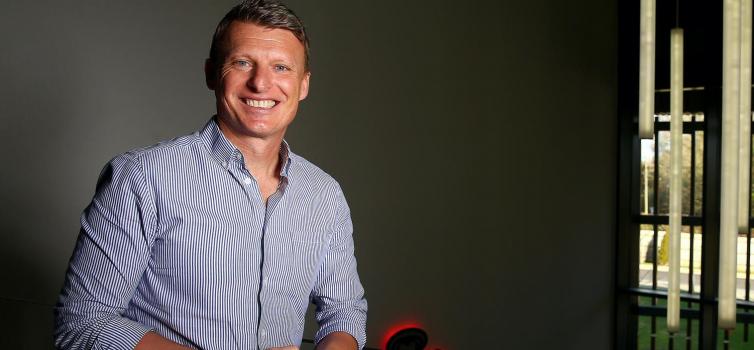Director of Football Crocker to leave Southampton at end of season

Crocker was appointed Director of Football Operations in November 2019 and officially started in January 2020
Written by Training Ground Guru — December 20, 2022
MATT CROCKER is to leave his position as Director of Football Operations at Southampton at the end of the season.
The Welshman joined the south coast club in January 2020 from the Football Association, where he had been Head of Coaching and Development for six years.
This is his second stint with the Saints, as he was their Academy Manager for a golden seven years during which they produced Gareth Bale, Theo Walcott, Callum Chambers, Adam Lallana and Luke Shaw.
In a statement, Southampton said: “The club would like to thank Matt for his excellent service and professionalism over his two spells at Southampton. He will continue to lead the club’s football operations across the men’s first team, Academy programme and the girls' and women's programme until the end of the season.
“Any update on plans for after this time will be communicated in due course.”
London-based investment firm Sport Republic took a controlling stake in Southampton in January and will now set about finding a replacement for Crocker, although the responsibilities (and title) of the Director of Football Operations job are now expected to change.
Rasmus Ankersen, the Chief Executive of Sport Republic, has considerable experience of the role, having previously been Director of Football at Brentford and sister club FC Midtjylland.
On Crocker’s watch, Southampton have been innovative in their football operations. Here are five examples:
1. LEARNING LAB
In April, the Saints announced they were launching a “unique” Learning Lab to embed a “research culture focused on modern Ecological Approaches” in their club and Academy.
The Lab was the brainchild of Head of Psychology Malcolm Frame and Dr Andrew Wilson, a Reader in Psychology at Leeds Beckett University. Three PhD projects have been deployed within the Learning Lab to "interrogate our coaching and learning environment, both on and off the pitch."
"One is trying to validate a psychological model and look at how well it informs practice and player development," said Iain Brunnschweiler, Southampton's Head of Technical Development.
"The second is looking at our coaching and learning environment and whether what we’ve got written down in our Academy player development framework and session design principles and coach development work is being represented on the ground. The third is about virtual reality."
2. B TEAM
In September 2020, Southampton announced that they were changing their Under-23s side to a B team. This was more than just a re-branding exercise.
Speaking at TGG's Individual Development Webinar last year, Crocker explained that the B Team would be more closely aligned with the senior side than the U23s had been. This was in terms of style of play, training and coaching methods - and the alignment was to be objectively assessed with data.
Crocker said the club would look to develop players within the B Team rather than sending them out on loan, as most other clubs do.
“There is no point in us sending an 18-year-old kid - no disrespect - to a League Two club if they don’t play similarly to us,” the former Football Association Head of Coaching said.
3. DEVELOPMENT COACHES
Last year, Southampton scrapped the traditional system of Head Coach and Assistant Coach within their U18 and B teams, instead introducing the roles of Game Coach and Individual Development Coach.
Speaking at the Individual Development Webinar, Crocker explained: "The Game Coach is responsible for delivering the Playbook, to make sure the players understand how we play, the terminology, the roles within the team; to make sure we prepare the players for the game effectively, to coach and deliver that game and then review that game.
"We have also introduced an Individual Development Coach to sit alongside. Their role is to make sure there are robust, simple, player-led Individual Development Plans (IDPs).
"When there’s a need identified by a player, they can go to that Individual Development Coach to pull the relevant staff in to talk about that issue, to find out where that support could come from and to make sure that, on a regular basis, we are reviewing the IDPs based on performances in training, in games, and making sure that they are on track.”
4. PLAYBOOK
Introduced in 2020, shortly after Crocker had arrived at the club, this is an evolving document that lays down the club’s style of play, training methods and coaching approach.
This applies not only to the first team but also the B team and Academy sides. The idea is to have a unified approach, much as the England sides do with their 'DNA', which was introduced by Dan Ashworth and Crocker. Hassenhuttl had a major role in formulating the Playbook, but so too did coaches within the senior and Academy set-up.
5. SPECIALIST COACHING
England introduced specialist coaching, with in-possession and out-of-possession specialists, in April 2016 when Crocker was at The FA. These coaches were employed across the England age groups.
Although there was scepticism to start with, the model was identified as having helped England enjoy great success at youth level in the following years.
Crocker introduced a similar system at Southampton, with Carl Martin moving up from the U18s to become an in-possession specialist with the first team from the start of this season. Alex Clapham was also hired as a set-piece specialist (although he subsequently departed), with Ruben Selles taking on his duties.




-1.png)





